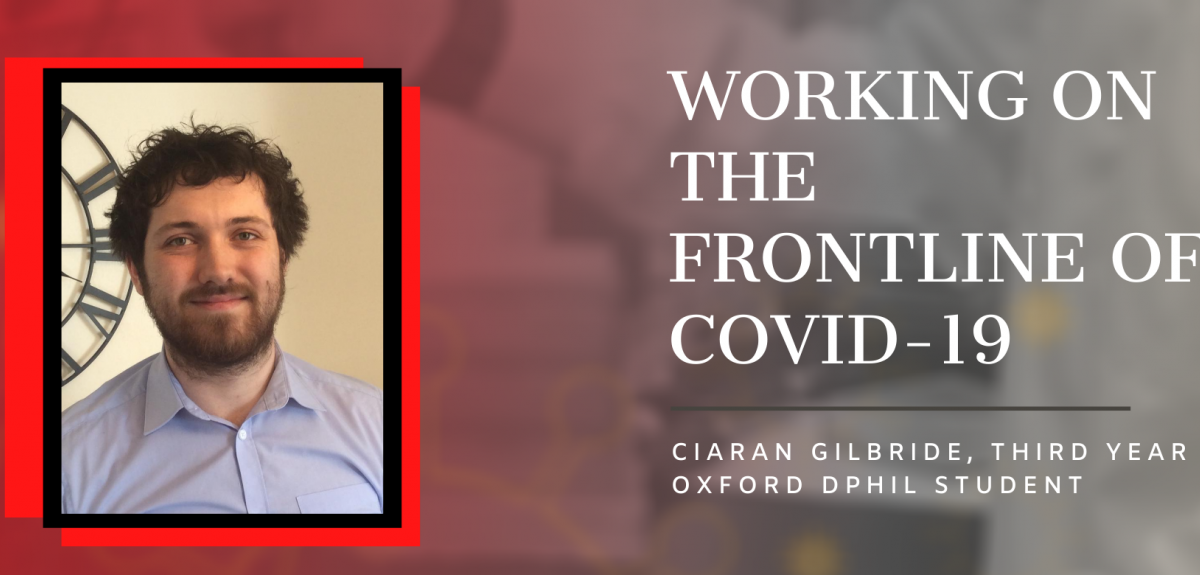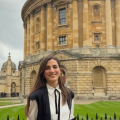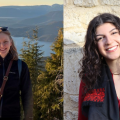
Working on the frontline of COVID-19 - student experience
Ciaran Gilbride is a third year Oxford DPhil student on the Interdisciplinary Biosciences Doctoral Training Partnership (DTP), where his lab look to develop vaccines against emerging viral diseases. He is part of the research team working on COVID-19 and has shared his experience of what life has been like contributing to Oxford’s response to the global pandemic.
Tell us about your journey to working on the COVID-19 vaccine at Oxford
I grew up in South-East London, but came to Oxford 7 years ago as an 18 year old, first pursuing a masters in Biochemistry at St Anne’s College, before I joined my DPhil scheme in 2017. Our lab look at developing vaccines against emerging viral diseases. My DPhil focuses on vaccines against Crimean Congo Haemorrhagic Fever (CCHFV), and the closely related Nairobi Sheep Disease (NSDV). My supervisors are Professors Teresa Lambe and Sarah Gilbert at the Jenner Institute and Dr Dalan Bailey at the Pirbright Institute.
What areas of research did you focus on prior to the Coronavirus outbreak?
My original research focused on CCHFV and NSDV. CCHFV is a WHO priority pathogen, with pandemic potential, the same designation as more well-known diseases such as Ebola or MERS. CCHFV is spread by ticks across the world, and during outbreaks kills 5-30% of those infected. NSDV is closely related to CCHFV but infects sheep and goats. It cannot infect humans (yet), but in outbreaks can kill 90% of flocks. Both are extremely dangerous diseases. My research looked at developing novel vaccines against these diseases and developing new ways for us to assess the strength of the immune response that our vaccines produce.
How did the opportunity come about to work on the vaccine?
My supervisors are the inventors of the vaccine so I am not sure I could have avoided working on it!
I was actually away from the Jenner when all this started, on an internship at Oxford University Innovation. There I helped out on a number of COVID-19 related projects at the start of lockdown. But once the trial started, I made sure I came back to help out and add an extra pair of hands to the team.
What areas of the research have you found most interesting to work on?
The main area I have been involved in has been looking at the immune response against the viral vector ChAdOx1. This is really interesting in the viral vector field as the responses to ChAdOx1 let us know if we’ll be able to use ChAdOx1 in future vaccines for humans.
What are the greatest challenges you have encountered?
For me, the biggest barrier has been getting the reagents to do our experiments. With so many companies on furlough or reduced staff, we often spend part of Friday worrying if the reagents for Monday’s experiments will arrive. Luckily, they always have so we haven’t slowed down.
What has surprised you most along the way?
I think probably the fact that everyone in my family is now intensely interested in what I do for my DPhil, as six months ago I think most of them didn’t know beyond the word ‘vaccines’. Now they’re asking for weekly updates that I’m not allowed to provide.
How much have you been able to work with your wider team given the restrictions surrounding the pandemic, and how has that altered the way that you work?
It has been interesting, both working with a wider and narrower range of people. Some parts of the trial require a large group of us working in concert to get samples processed and analysed. But most of my work is done with just myself and one other person, so the focus is much narrower. In the lab, we scientists take up so much space in normal time, that social distancing hasn’t been too much of a problem.
How easy do you find it to switch off from all things Coronavirus when so much of your focus is spent on the issue and in the media?
It has been very hard. Covid does seem to be ubiquitous. However, being very tired from working through weekends does help you switch off.
What has lockdown looked like for you?
Well, I think at the beginning of lockdown myself and my partner realised how introverted we were when not much changed for us except more working from home. So not much has changed in my off time. I tried some baking early on, but everything needed a biscuit base, as I couldn’t find any flour anywhere. We’ve also just started binging Killing Eve which is fantastic.
What will you take away from working on the COVID-19 vaccine?
Collaboration is king. We all think of our work as the most important thing, but achievements like this need us working together. Progressing a vaccine from sequence identification to Phase III trials in under six months is a huge achievement and only came about from thousands of people working together towards one goal across a number of organisations. We are so much better when we work together.
Find out more about the Oxford COVID-19 Vaccine Team and latest research.
 Student story: Finding space for Kosovo at Oxford
Student story: Finding space for Kosovo at Oxford
 Oxford students shortlisted as McCall MacBain Scholarship finalists
Oxford students shortlisted as McCall MacBain Scholarship finalists
 Student story: My time at Oxford has been deeply transformative
Student story: My time at Oxford has been deeply transformative
 Welfare blog: Dealing with imposter syndrome
Welfare blog: Dealing with imposter syndrome
 Student story: Rowing sabbatical officer
Student story: Rowing sabbatical officer